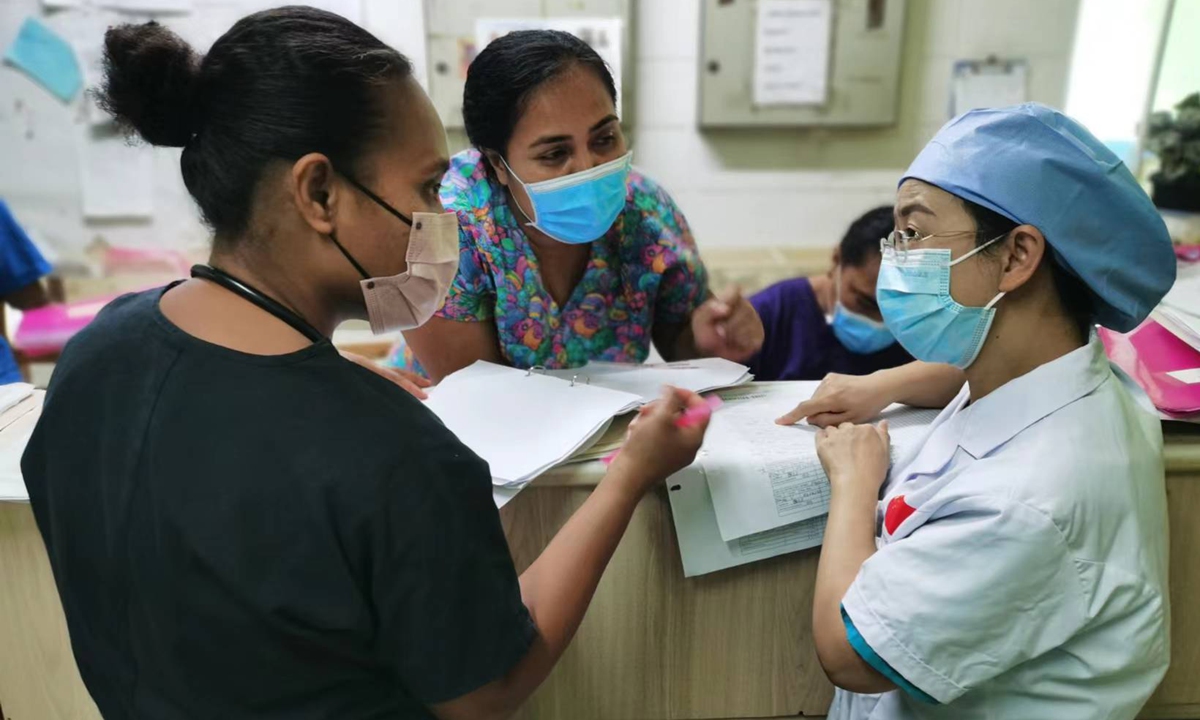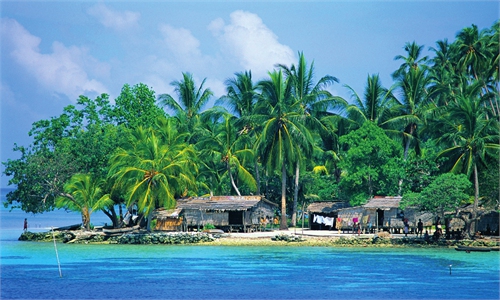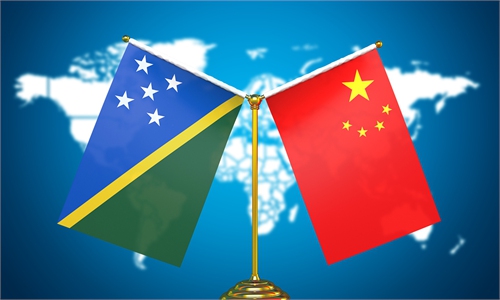Exclusive: Chinese medical team in Solomon Islands wins respect with professionalism, sincerity

Chinese doctor is communicating with local doctors in Pacific Islands. Courtesy of Zhou
Davis used to be a healthy, happy 19-year-old living on Guadalcanal, Solomon Islands. His life was devastated by cerebral malaria a year ago, which left him unable to speak, chew and control his face muscles.
Until he met the Chinese doctor Lei Yandong from the Chinese medical team in Solomon Islands, Davis's symptoms finally got improved significantly.
Davis's story not only impressed local doctors, but also caught great attention among local newspapers. "Chinese doctors are working wonders with acupuncture," reads the headline of The Island Sun.
In March, based on the relevant protocol signed by the governments of China and the Solomon Islands, the first batch of Chinese medical team with six members arrived in Solomon Islands for a one-year work.
The medical team, with great sincerity, has not only shown the good image of Chinese doctors, but also won the trust and respect from local doctors and patients.
Here come Chinese doctors
Under the request of the Solomon Islands government, on February 24, the two countries signed a protocol on dispatching Chinese medical teams to work in the Solomon Islands. The task was handed over to Southwest China's Guizhou Province. After about two weeks, the medical team was formed officially, and the six members arrived at the southern Pacific country on March 22.
The work of the medical team includes directly providing medical services to patients in the aided hospital, teaching and training doctors and conducting free clinic visits and health education, Zhou Xinfa, leader of the medical team, told the Global Times in an exclusive interview.
The team also makes full use of the resources back in China, expanding the service capacity of the medical team. They also provide diagnosis and treatment consultation for Chinese companies and overseas Chinese citizens in the Solomon Islands.
Zhou is from the Guizhou Provincial Health Commission and is in charge of the overall work of the medical team. In the team, general practitioner Mu Qiong, nephrologist Xu Junjun a and acupuncturist Lei Yandong, who treated Davis, are doctors from the Affiliated Hospital of Guizhou Medical University. In addition, the team also contains an interpreter and a chef.
The Chinese medical team has been working at the National Referral Hospital in capital Honiara of the Solomon Islands.
Though being the country's top public hospital, the National Referral Hospital faces problems such as low-quality medical services, outdated hardware, and a lack of medicines and equipment - the hospital itself was rebuilt on the field hospital of the US during World War II.
Facing such a situation, the medical team has made preparations in advance. They carried medicines with a total value of 1 million yuan ($147,000) with them to the Solomon Islands.
On August 5, the first hemodialysis machine donated by China was delivered to the National Referral Hospital.
"The Solomon Islands were not capable of hemodialysis before, and the new equipment and consumables donated by China brought hope to local patients with kidney failure," Zhou said, adding that Doctor Xu has begun to teach local collogues the techniques of kidney dialysis.
China and the Solomon Islands officially established diplomatic relations in September 2019. As the first batch of Chinese medical team, they face a great challenge in making local islanders entrust their health and life to them.
"We are not afraid of enduring hardships, but we are afraid that locals will not accept us," Zhou said. At the very beginning, during work, the team also encountered situations of incomprehension. "But we were patient. We made friends with local doctors, gradually showing our sincerity."
Due to receiving a large number of patients transferred from lower-level hospitals from around the island country, the National Referral Hospital is full almost every day, leaving the Chinese doctors working at a high load every day.
At the same time, the medical team also needs to overcome various difficulties such as language and infectious diseases. "Malaria is prevalent in the Solomon Islands. One of our team members contracted malaria shortly after arriving, and even wrote his last words," Zhou said.
According to Zhou, experts from Australia and other countries will also visit Solomon on a regular basis. "But the local doctors told us that the Australian experts did not let local doctors see them when they performed the surgery. They did not teach the local doctors the technique."
Instead, Chinese doctors make every effort to impart experience and technology to local hospitals and doctors, bringing them confidence, Zhou said.
In addition, more than 30 expert teams back in China have been helping with the medical team in the Solomon Islands, which has increased the platforms and opportunities for peer exchanges and consultation between China and Solomon Islands.
In response to the high incidence of diseases such as diabetes, kidney disease, and strokes in the Solomon Islands, the medical team, under the support of the Chinese Embassy, has been successively publishing columns in local newspapers to introduce knowledge on prevention and treatment of the diseases.
The magical acupuncture
"Thank you China Medical Team, especially Doctor Jack Lei for giving much of your time with your experiences and technics in delivering acupuncture treatment to me as one of your patients," wrote a local resident on the Facebook page of the Chinese medical team.
In less than half a year, Lei, an expert in traditional Chinese medicine and acupuncture from the medical team, has changed the local people's attitude toward acupuncture from "never heard before" to "such a magic."
"A lot of obstacles have been overcome in this transformation," Zhou said. As the Solomon Islands have no knowledge of traditional Chinese medicine system, Lei's diploma was not recognized in the island country.
Thankfully, with the support and efforts of the Chinese embassy, the medical team finally obtained the administrative license from the local health authority, temporarily allowing Lei to start acupuncture at the National Referral Hospital.
Under disbelief and doubts from local doctors, Lei took over Davis, whose situation was believed by local doctors to be untreatable. However, after three treatments, Davis was able to chew and pronounce. After 10 treatments of acupunctures, Davis has been able to eat normal food by himself.
"Local doctors, Davis and his relatives thought it was magical," Zhou said. "Patients began to queue outside the rehabilitation department clinics."
Currently, Lei has effectively treated many patients with facial paralysis, lumbar disc herniation, shoulder and neck pain or other symptoms. Local doctors and people have a new understanding of traditional Chinese medicine and acupuncture.
"It is with great excitement that we have learned that many patients undergoing acupuncture are reporting improvements to their bodies. This will be an area where my ministry will further look into to ensure that we support our local medical professionals who will pursue further education in the area of Acupuncture," Dr. Culwick Togamana, Minister of Health and Medical Services of the Solomon Islands, said while visiting the Chinese medical team in August 5.
Zhou said that due to the shortage of medicines and testing reagents and the aging of equipment in the hospitals of Solomon Islands, traditional Chinese medicine, which can be treated by looking, smelling, inquiring, and acupuncture, is especially suitable for promotion in the country.
Recently, two doctors from the National Referral Hospital voluntarily started learning acupuncture with Lei.
Zhou revealed that in the future, the exchanges and training of medical personnel between China and the Solomon Islands will be more frequent. At present, a group of medical students from the island country have gone to China for study.
The China-funded Comprehensive Medical Centre at the National Referral Hospital in the Solomon Islands has completed on-site feasibility study and would soon be construction, local Star News reported in May.
"A big thank you to the government and people of China," Minister of Health and Medical Services permanent secretary Pauline McNeil said.
"As the first batch of Chinese medical team in the Solomon Islands, our mission is to lay a solid foundation, stand firm, hold our ground and pave the way for the follow-up team members," Zhou noted.
"Through the continuous efforts of the medical teams, the pragmatic cooperation in medical and health care between China and the Solomon Islands will surely achieve fruitful results and gain the sincere support of local people," he said.



